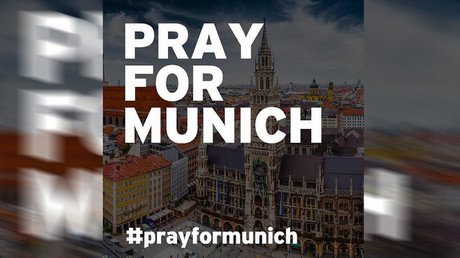Shooting rampage at Munich mall continues EU terror trend
The shooting at Olympia Mall in Munich is yet another in a series of deadly assaults in Europe, following horrific terror attacks in Paris and Brussels. It's the second attack in the German state of Bavaria in less than a week.
READ LATEST: 18yo German-Iranian goes on shooting rampage, kills 9 in Munich
At least nine people have been confirmed dead and 20 others injured in a shooting at the Olympia shopping mall in the Bavarian capital on Friday.
LIVE UPDATES on Munich mall shooting: Multiple casualties, gunman commits suicide
An apparently lone-wolf assailant fired at people at a fast-food restaurant at the mall and a nearby railway station. A ninth body was found less than 1km from the initial scene of the attack and belonged to the attacker, police confirmed.
No group has yet claimed responsibility for the attack, but supporters of Islamic State (IS, formerly ISIS/ISIL) have already been celebrating the shooting online. At the same time it was reported that the attacker shouted racial and anti-immigrant slurs during the rampage.
While the motives of the shooter are still unknown, police are treating the incident as an act of terror.
German train knife & ax attack
The Munich shooting rampage has become the second terror attack in Bavaria in less than a week. On Monday as five people were injured and over a dozen left in shock after an axe and knife-wielding man assaulted passengers on a train near the town of Würzburg.
The attacker then tried to escape the train, but was cornered by the Special Forces and was, eventually, gunned down.
He was identified as a 17-year-old Afghan refugee, Muhammad Riyad, who arrived in Germany two years ago as an unaccompanied minor.
IS called Riyad “a soldier of the Caliphate," with a handmade IS flag discovered in his apartment.
Nice truck attack
Europe is currently witnessing a sharp increase in the number of terror attacks claiming dozens of innocent lives. On July 14, 84 people were killed and over 300 injured in the French resort city of Nice when a 19-ton truck rammed the crowd gathered for Bastille Day celebrations.
The driver, Mohamed Lahouaiej-Bouhlel, a Tunisian-born resident of France, was shot dead in a gunfire exchange with the police.
READ MORE: Texts, city tours, empty bank account & rented car: How Nice attacker planned terror act
Islamic State took responsibility for the attack, saying Lahouaiej-Bouhlel answered its call to target citizens of the country’s fighting the terror group in Syria and Iraq.
According to the French police, the assailant has been planning the crime for months and had five accomplices, who were all detained.
Brussels bombings
On March 22, 32 people lost their lives and 300 others were injured in three coordinated suicide bombings in Belgian capital, Brussels.
Two explosions rocked the Zaventem airport, which another was carried out at the Maalbeek metro station in the city’s center.
The responsibility for the attack was also claimed by Islamic State, with the perpetrators, who all died in the blasts, being part of the same group, which organized the Paris attack on November 13, 2015.
Paris attacks
Back then, 130 people were killed 368 wounded in a series of coordinated attack across the French capital.
Three suicide bombers blew themselves up outside the Stade de France in Saint-Denis where France and Germany played a friendly football match.
READ MORE: Paris received terror attack warning 5 months before assaults – report
There was a mass shooting and hostage situation at the Bataclan theatre where 89 people lost their lives.
Several mass shootings and a suicide bombing also took place at cafes and restaurants in other parts of the city.
The attack was also claimed by Islamic State, which said that it was retaliation for the French participation in the bombing campaign against the group.
A fresh report by Europol acknowledged that Europe is becoming increasingly unsafe due to the rise in terrorist activity.
There were 211 terror attacks in the EU last year, which is a 38 percent increase compared to 152 terror attacks in 2013. The number of terrorist-related arrest has doubled from 535 in 2013 to 1077 in 2015, meaning that many plots have been foiled, EU Terrorism Situation and Trend Report 2016 stressed.
The report stressed the difficulty of dealing with the so-called lone wolf attack as IS urges their supporters to stage attacks in their home countries.
With 5000 Europeans reportedly fighting for jihadists in Syria, the European police also warned about the increased threat posed by militants, returning from Syria and Iraq.
Europol director, Rob Wainwright, stressed in the report that EU is now facing a “shifting and increasing range of threats emanating from jihadist groups and individuals.
“The so-called Islamic State has demonstrated its ability to strike at will, at multiple times and at a diverse range of targets,” he added.
According to a poll released by ‘Project 28’ in early June, the majority of EU citizens believe Islamic State will pose a serious threat to Europe over the next five years and expect the repeat of terror attacks like the one in Paris.
36 percent of respondents said “it is very likely” that a Paris-style attack would happen in their country,” while another 50 percent believe the attack is “likely” to happen.
The Europeans also saw a direct link between mass illegal migration and terrorism, with 65 percent “agreeing with the statement that the migrant wave increases the threat of terrorism in their country,” the poll said.














